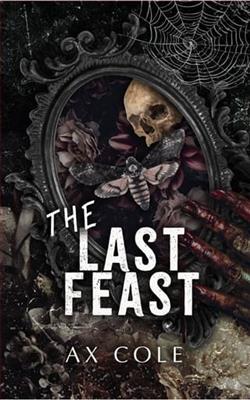Page 21 of Breakout Year
He said the name as if he was trying it out, different from the almost-grudging way people sometimes said Akiva. Akiva wasn’t going to think anything of it, or of the teasing flash of Eitan’s dark brown eyes. Akiva had agreed to do a favor—a job, really—for Eitan, but he wasn’t on the clock yet. He didn’t need to pretend.
Despite the rain, Eitan looked pulled together—dry, casual in black jeans and expensive sneakers, the kind of T-shirt that must have cost a lot to look that distressed. “I figured, what goes better together than books and rain, you know?” He studied the room. “So when you said you had to work…”
Up front, Sue scrolled through the slides Akiva had labored over. “I work in publishing. Sort of,” Akiva said.
“I thought you were a model.”
“Sometimes.” Mostly when the rent is due. Akiva nodded to Sue. “The rest of the time I work for her.”
Eitan hummed. “Is that what you’ve been doing since you left?”
Akiva’s spine went rigid. “Mostly.”
“Mostly?” Eitan repeated, a question tilting his voice. He drummed his fingers against the metal edge of the chair as he waited for Akiva to answer. When Akiva didn’t say anything else, he dug in his pocket, retrieved a cough drop, and unsheathed it. The wrapper crinkled.
People were beginning to look at them. Akiva wondered if this counted as their date. Given that he was sitting as stiff as his folding chair, purposefully away from Eitan, probably not. “Can we talk,”Akiva whispered, “when this is over?”
Eitan smiled. The effect was no less dazzling than it had been in Arizona when Akiva used to watch it shimmer like heat off desert pavement. “Sure.”
Distantly, Sue tapped the mic a few times to gather the room’s attention. “I got into writing,” she said, “after my husband disappeared under suspicious circumstances. It was fortunate luck for a mystery writer: I came home one day to find him gone—clothes, hair pomade, that damn car he spent so much time working on. Now I knew why. It was because he was going to up and leave me in it. Other women at the time had bank accounts, but I didn’t. So, I took a job as a typist…”
She flipped to the next slide that showed photos Akiva had scanned for her, the typewriter on which she’d written her first book, her library card that she’d put miles and miles on. “In retrospect, borrowing a bunch of books about what happens after your husband disappears isn’t the best way to remove suspicion that you disappeared him.”
Laughter, followed by Eitan’s glance as if asking, Do you really work for her? Because that tended to be everyone’s reaction to Sue: that she and Akiva went together like peanut butter and borscht. Which was to say, not at all.
The talk went on. Sue spoke. Akiva tried to listen, aware—too aware—when Eitan went into full sprawl mode. Their knees weren’t brushing so much as held apart by a shivering layer of air. Eitan shifted again. Boredom, perhaps.
Akiva grabbed a notebook from his backpack, scrawled, You can leave if you want on a blank page, and slid it to Eitan. Eitan grinned. Motioned for Akiva’s pen. Wrote something and slid it back. It’s interesting. His handwriting was slightly haphazard. Akiva resented the crooked crossbar on one t and the ease with which he tapped the muscled edge of his thigh against Akiva’s leg, a reminder of the compact efficiency of infielder bodies that Akiva really didn’t need in a professional context.
You’re really into the technical aspects of structuring mystery books? Akiva countered.
Eitan scribbled a response. No, but you are.
Akiva didn’t deny it, and he didn’t glance to where he could practically feel Eitan radiating a smile. If he folded his hands in his lap, he wouldn’t be tempted to write something back and encourage him.
Sue changed to another slide, one Akiva had known was coming. He sucked in a breath. Held it. Purposefully did not look at Eitan to see what he thought of the cover—a woman in a profusion of a ballgown holding a knife. It was historical mystery, right on the edge of romance, and Akiva was immensely proud of having worked with Sue on it and also wanted to crawl under his chair.
Next to him, Eitan made an interested sound. “Have you read that one?”
Akiva nodded. It wasn’t technically a lie.
“It’s good?”
“I think so.”
“It must be if you’re smiling like that,” Eitan said, and so Akiva scowled on general principle. For whatever reason, Eitan was grinning at him again.
A few minutes later, Sue’s talk ended in a burst of applause. Attendees pushed forward, all intent on getting her signature stamped on their books. Eitan rose and stretched, arms pressing against the sleeves of his T-shirt, testing the limits of their seams. Akiva suppressed the urge to shoo him.
“I didn’t know there was so much to all this.” Eitan waved a hand, like he was indicating Sue or possibly books in general. “I learned some stuff.”
“Some stuff?” Akiva tried, and failed, to keep the tone of slight outrage out of his voice.
“Yep, stuff. Like that there’s something about this book that makes you want me not to read it.” Eitan held up his phone, which displayed an order confirmation for the audio version of the book. “Looking forward to reading about…” He recited the promotional text about a garment worker who must choose between the charming new-money scion of a local family and the dashing, masked union agitator who’d come to organize her factory. (Neither of whom had dark hair and olive skin and eyes that laughed even when he wasn’t smiling. And both of whom might just be the same person, but, ahem, spoilers.)
Akiva was well acquainted with embarrassment: this particular wash had a strange tinge of pride. He absolutely didn’t want Eitan to read that particular book, but if he did, he wanted him to love it. Which he probably wouldn’t.
Also there was fucking, and Eitan might read that too. Akiva didn’t think he could shock someone who’d spent most of his life in baseball clubhouses, but there was proportionately a lot of fucking. A lot.















